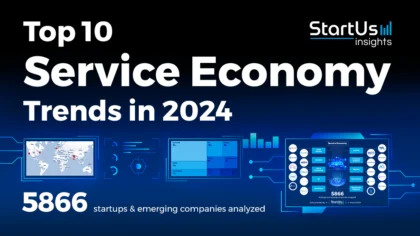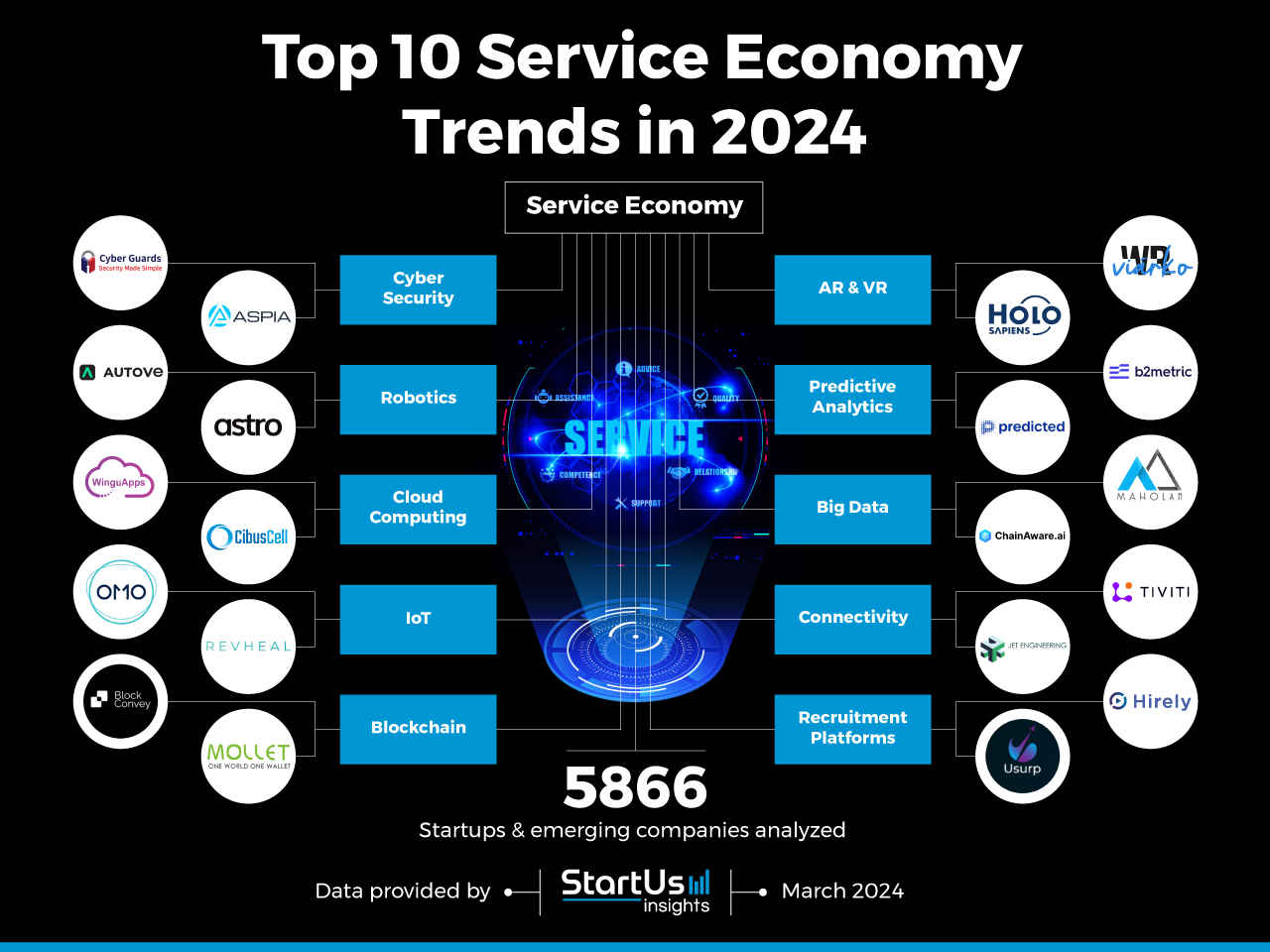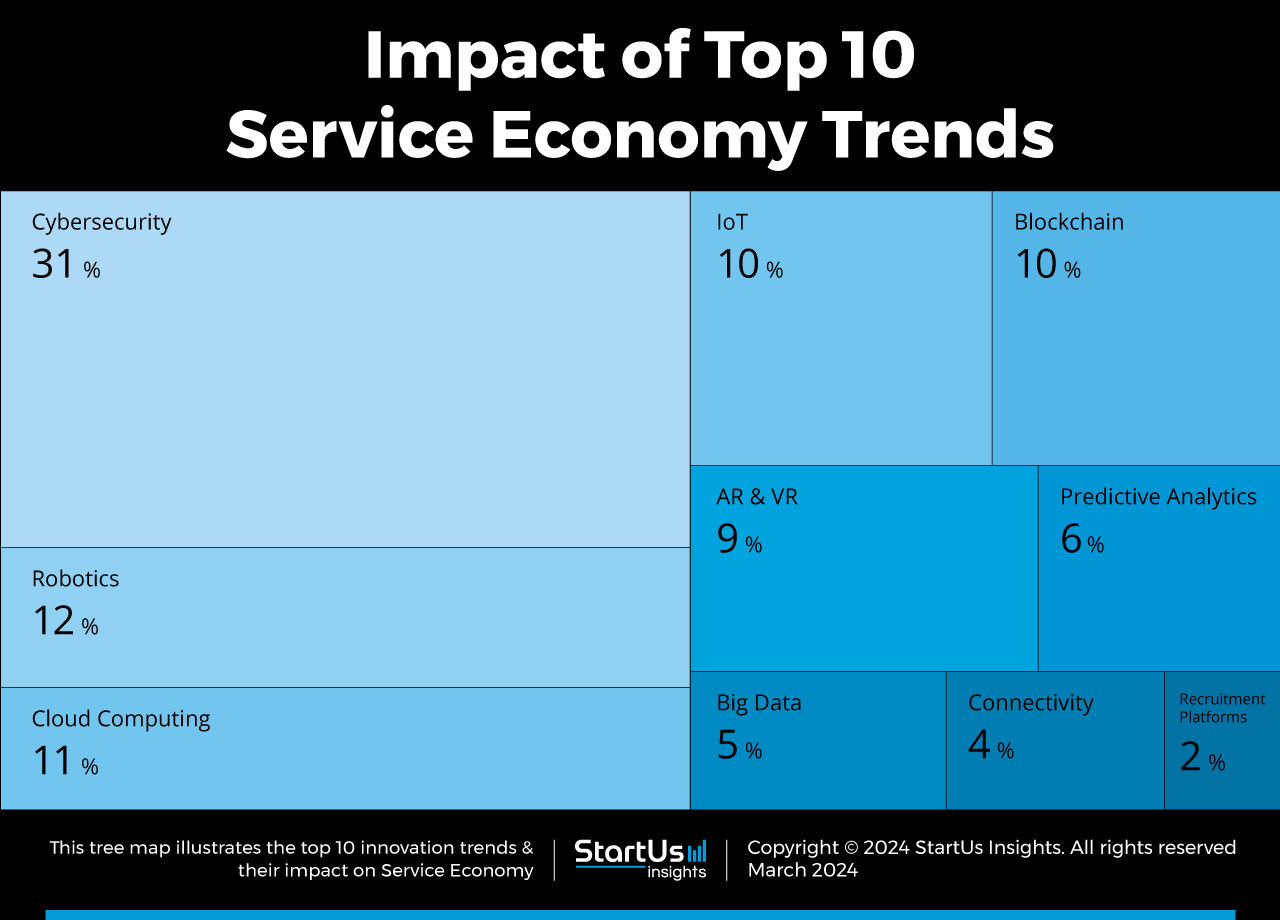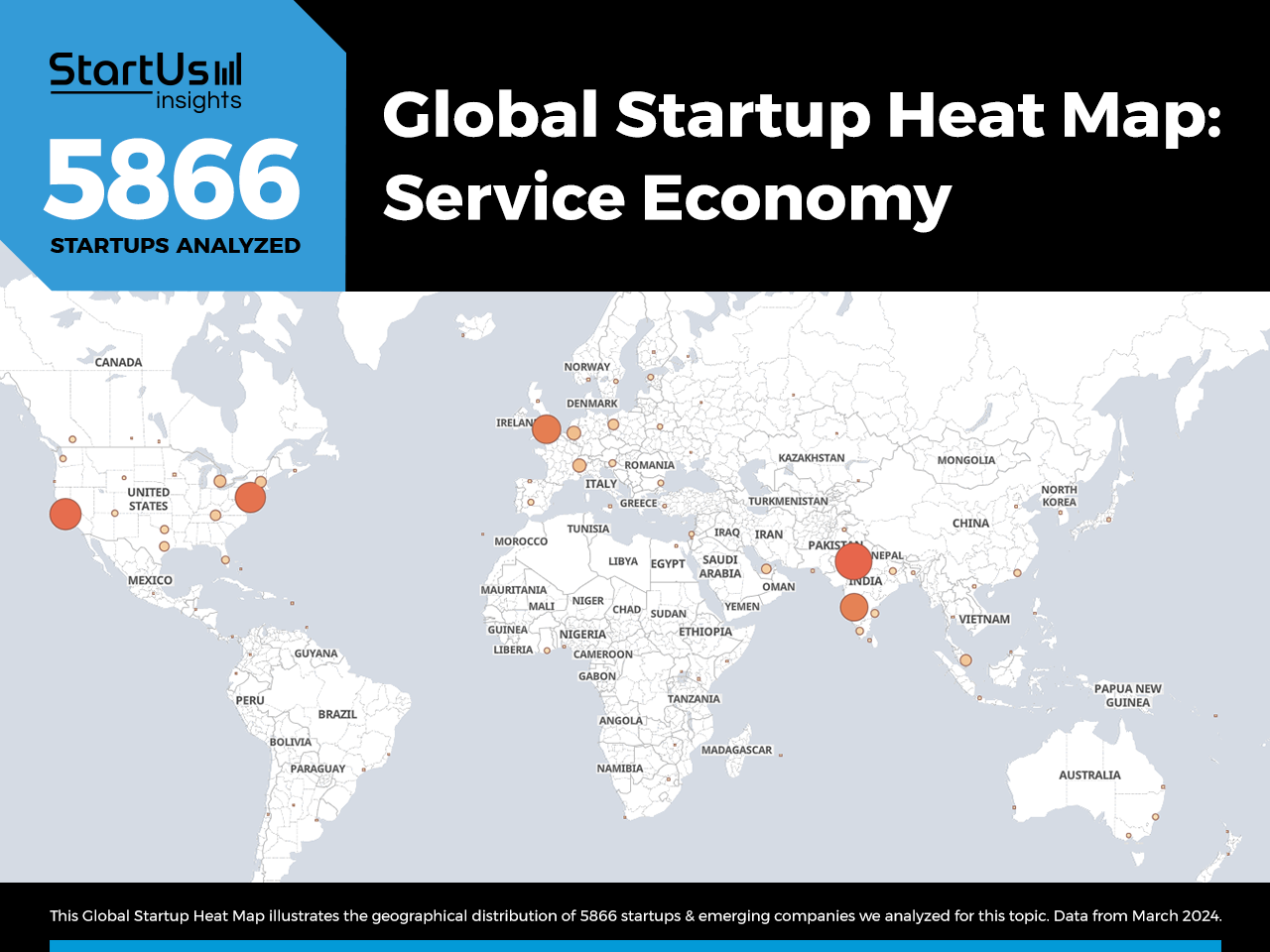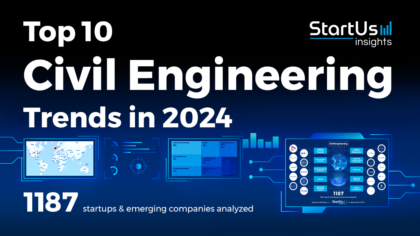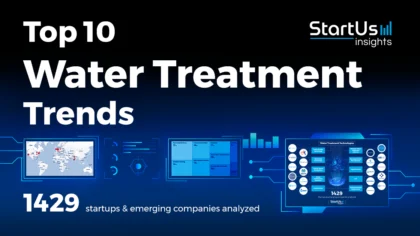Increasing global workforce shortages and the demand for personalized services place significant pressure on the service industry. Additionally, the industry is facing issues in maintaining high-quality customer service due to rising customer expectations and competition from digital platforms. However, innovations in the service economy offer promising solutions to tackle these concerns. For example, artificial intelligence (AI) for improved personalization, blockchain for secure and transparent transactions, and automation of service tasks. These innovations increase efficiency and reduce operational costs while improving customer satisfaction by offering faster, more reliable services.
Top 10 Service Economy Trends in 2024
- Cybersecurity
- Robotics
- Cloud Computing
- Internet of Things (IoT)
- Blockchain
- Augmented Reality (AR) & Virtual Reality (VR)
- Predictive Analytics
- Big Data
- Connectivity Technologies
- Recruitment Platforms
Innovation Map outlines the Top 10 Trends in Service Economy & 20 Promising Startups
For this in-depth research on the Top Service Economy Trends & Startups, we analyzed a sample of 5000+ global startups & scaleups. This data-driven research provides innovation intelligence that helps you improve strategic decision-making by giving you an overview of emerging technologies in the service economy industry. In the Service Economy Innovation Map, you get a comprehensive overview of the innovation trends & startups that impact your company.
These insights are derived by working with our Big Data & Artificial Intelligence-powered StartUs Insights Discovery Platform, covering 3 790 000+ startups & scaleups globally. As the world’s largest resource for data on emerging companies, the SaaS platform enables you to identify relevant technologies and industry trends quickly & exhaustively.
Tree Map reveals the Impact of the Top 10 Service Economy Trends in 2024
Based on the Service Economy Innovation Map, the Tree Map below illustrates the impact of the Top 10 Service Economy Trends in 2024. Cybersecurity safeguards digital infrastructure, ensuring the safety and integrity of data across all service sectors. Robotics and IoT devices further streamline operations and enhance service delivery through automation and real-time data collection. Additionally, cloud computing offers scalable resources and infrastructure on demand, enabling businesses to adapt swiftly to reduce overhead costs. Blockchain, at the same time, increases transparency, security, and efficiency in transactions and record-keeping.
AR & VR technologies are elevating customer experiences by offering immersive interactions, while predictive analytics and big data provide insights into consumer behavior, enabling personalized and anticipatory services. Moreover, enhanced connectivity facilitates seamless communication and operation in an increasingly digital world. Recruitment platforms are also transforming the talent acquisition landscape, making the process more efficient and widening the talent pool for organizations. Together, these technologies drive innovation, efficiency, and customization in the service economy, setting new standards for competitiveness and success.
Global Startup Heat Map covers 5866 Service Economy Startups & Scaleups
The Global Startup Heat Map below highlights the global distribution of the 5866 exemplary startups & scaleups that we analyzed for this research. Created through the StartUs Insights Discovery Platform, the Heat Map reveals high startup activity in India and the US, followed by the UK.
Below, you get to meet 20 out of these 5866 promising startups & scaleups as well as the solutions they develop. These service economy startups are hand-picked based on criteria such as founding year, location, funding raised & more. Depending on your specific needs, your top picks might look entirely different.
Interested in exploring all 5800+ service economy startups & scaleups?
10 Emerging Service Economy Trends in 2024
1. Cybersecurity
The increasing sophistication of cyber-attacks targeting customer data and transaction systems threatens the security of sensitive information and also undermines customer trust and loyalty. Innovations in cyber security are addressing this through advanced threat detection systems that use machine learning to identify and neutralize threats in real time. Additionally, such solutions feature filtering techniques and predictive analytics to identify potential vulnerabilities and breaches proactively.
Blockchain-based cybersecurity also offers secure, transparent transactions while smart contracts ensure an additional layer of security in customer interactions. Cybersecurity providers safeguard the service sector from growing malicious attacks as they integrate digitalization and Industry 4.0.
Cyber Guards offers Cybersecurity-as-a-Service
US-based startup Cyber Guards provides comprehensive monitoring for advanced threats across various networks and cloud environments. The startup’s security operation center-as-a-service (SOCaaS) ensures faster detection and reduced incident response times, minimizing the impact of security incidents. Besides, it features attack path management that simulates potential vulnerabilities and frequent assessments to ensure regulatory compliance.
In this way, the startup offers a cost-effective alternative to in-house SOC with continuous protection against evolving online threats. Cyber Guards’ cybersecurity also enables medium and small-sized businesses to protect their digital assets and data, reducing operating expenses (OPEX).
ASPIA Infotech simplifies Security Incident Management
ASPIA Infotech is an Indian startup that specializes in automated security incident management. Its platform automates the response to security incidents, ensuring optimal handling and containment with integration with security information and event management (SIEM) tools, enriching incident records, and facilitating swift updates.
ASPIA Infotech’s system also prioritizes incidents based on risk, centralizes diagnosis, and records resolutions to prevent future occurrences. Further, the startup’s centralized dashboard offers a comprehensive view of the security state, aiding in efficient incident management. ASPIA Infotech’s platform thus allows companies in the service sector and more to streamline security processes and improve resilience against cyber threats.
2. Robotics
Robotics in the service economy is rapidly transforming how businesses operate and deliver services to customers. Robots now replace humans in tasks like handling orders in restaurants and managing inventory in warehouses. This shift speeds up operations and also reduces human error, ensuring a higher quality of service. Additionally, robotics in healthcare is improving patient care, with robots assisting in surgeries and medication dispensing. In retail, robots offer personalized shopping experiences and assist in stock management.
The integration of robotics in the service industry is also creating new job opportunities, requiring a workforce skilled in robotics maintenance and programming. As customer expectations for speed, accuracy, and personalization grow, robotics enables a novel way to meet these demands while optimizing costs. The trend towards robotics in the service economy thus signifies a move towards improving service delivery and customer experiences.
Autove Robotics makes Autonomous Delivery Robots
Singapore-based startup Autove Robotics creates autonomous delivery robots for efficient and contactless service. Its product, Flashbot, uses light detection and ranging (LiDAR) and red-blue-green depth (RGBD) cameras for navigation. Additionally, Flashbot includes UV germicidal lamps for sterilization, enhancing safety and hygiene.
Further, the robot’s IoT technology enables communication with building infrastructure, allowing it to operate elevators and doors autonomously. Flashbot‘s design includes a multi-functional compartment, maximizing space for various delivery tasks. It thus offers autonomous delivery solutions for hotels, high-rise buildings, and other establishments.
Astro Technologies provides Robots-as-a-Service
US-based startup Astro Technologies offers robotics-as-a-service (RaaS) to streamline warehouse operations. Moreover, it allows businesses to deploy advanced robotics technology quickly and easily without significant capital expenditure. The startup’s robots feature usage-based pricing, aligning costs with actual throughput and ROI.
Further, the mobile robots integrate with existing warehouse infrastructure, enhancing flexibility and scalability. They significantly increase productivity, and adaptability, and serve as a cost-effective automation solution in areas like logistics and supply chain management.
3. Cloud Computing
Modern technology services require use or require high computing power to process large volumes of data, resulting in higher costs and complex IT infrastructures. Cloud computing addresses this by offering scalable, on-demand computing resources. This allows businesses to efficiently process massive datasets without extensive hardware investments. Cloud-based serverless computing models also enable companies to run applications and services without managing the underlying servers.
Further, cloud-based disaster recovery solutions provide service businesses with more robust and cost-effective data backup and recovery methods, enhancing data resilience. Additionally, cloud-powered tools address collaboration and accessibility in decentralized workforces. This allows teams to work together across locations, improving productivity and communication. Lastly, centralizing data from the entire supply or value chain allows service industries to optimize resources and reduce costs.
WinguApps offers Cloud-Based Payroll Software-as-a-Service
Kenyan startup WinguApps creates EasyPay, a cloud-based software solution to manage employee salaries, deductions, and tax filings. It features comprehensive statutory reports, payslips, payment disbursements, and email notifications, ensuring efficient payroll processing.
The software also integrates with various biometric devices for attendance tracking and supports leave management with email notifications for leave administrators and staff. Moreover, EasyPay‘s employee self-service portal allows employees in service-based industries like food, customer service, etc. to access their payroll information securely.
CibusCell specializes in H2 Power Plant Management
CibusCell is a German startup that develops a SaaS cloud platform for managing H2 power plants. The platform combines big data, AI, and digital collaboration to optimize hydrogen production. It also features real-time connection to devices for sensor data, secure IoT hub access, and integrates with legacy data systems.
Additionally, the platform enables financial simulation and optimization, including CAPEX and OPEX optimization, and revenue optimization of electricity and H2 production. In this way, the platform facilitates the expansion of data from other hydrogen value chains into a centralized view for more efficient management of hydrogen grids.
4. Internet of Things
As industrialized economies continue to evolve, the service sector’s growth outpaces that of traditional manufacturing, powered by digital innovation and connectivity. IoT plays a crucial role in this transformation. It enables smart services and solutions to improve operational efficiency and customer experiences across industries like healthcare, retail, and urban development. For instance, the healthcare industry integrates IoT to track the health parameters of outpatients, ensuring timely interventions.
Further, the integration of IoT in product offerings elevates customer experiences, distinguishing products by the value-added services they provide. For example, a smart refrigerator becomes a service hub that manages food inventory, suggests recipes based on available ingredients, and even orders groceries. This shift underscores the increasing symbiosis between products and services, where IoT enables products to deliver enhanced services. As a result, connected products and services create more value for customers and new revenue streams for businesses.
OMO Systems specializes in Property Automation
OMO Systems is a US-based startup that creates systems for smart home ecosystems tailored for multi-apartment buildings. Its OMO Hub and control panel are integrated with the OMO App for home control with features like mobile key access and face recognition for security and convenience. The ecosystem also supports services like video surveillance, flood monitoring, and automatic shut-off of gas and water to prevent accidents.
Besides, residents control and monitor various access points, including doors, elevators, and gates, through the OMO App. In this way, OMO Systems’ property automation services and solutions offer enhanced security, efficiency, and modern living experiences for residents and property managers.
Revheal enables Preventive Care
Revheal is an Italian startup that develops an IoT infrastructure for preventive patient care. It streams patient physiological data from wearable devices and smart medical-grade device kits. This way, it frees healthcare professionals from tedious data entry tasks, also reducing manual errors.
Additionally, the platform supports continuous patient monitoring (CPM) and streamlines healthcare data management by integrating with existing EHR systems. The startup’s algorithms further analyze the data to predict biomarkers such as blood pressure, heart rates, and stress levels, to identify meaningful fluctuations and ensure timely care delivery.
5. Blockchain
Blockchain technology is becoming increasingly significant in the service economy, especially in decentralized finance (DeFi) and traditional financial institutions. It enables transparent asset movement and real-time settlement. Moreover, NFTs are opening new revenue streams by enabling the sale of digital products and assets. This broad adoption underscores blockchain’s potential to innovate and secure business processes.
In healthcare, it ensures the security of medical records and streamlines patient data management. The education sector leverages blockchain to provide a reliable verification system for academic credentials, enhancing trust and efficiency. The technology’s application in supply chain management further improves transparency and traceability, addressing counterfeit issues. Across these sectors, blockchain’s decentralized nature offers significant advantages in security, efficiency, and transparency, transforming service delivery.
Block Convey simplifies Health Data Management
Block Convey is a US-based startup that develops blockchain solutions for health data management. The startup secures patient data exchange using distributed and encrypted data collection systems. Block Convey’s blockchain-based EHR solutions also ensure secure, interoperable data sharing across multiple healthcare providers, improving the continuity of care.
Further, Block Convey provides solutions to validate data for clinical trials and deliver telemedicine. The startup’s solutions allow hospitals to mitigate in-house software and blockchain development as well as accelerate time-to-market while ensuring data integrity and safety.
MOLLET enables Cross-Border, Cross-Currencies Global Payments
MOLLET is an Indian startup that makes a wallet to pay and receive money globally. It is an AI-driven blockchain-powered multi-currency instant payment system that facilitates error-free, secure, and fast payments. As a result, MOLLET’s wallet finds applications in metro trail ticketing, bus ticketing, shopping point of sales, and online shopping.

6. Augmented & Virtual Reality
AR and VR are reshaping the service economy by enhancing customer engagement and operational processes. These technologies are particularly influential in retail, where AR allows consumers to visualize products in their environment before making a purchase. This leads to more informed decisions and increased satisfaction. VR, on the other hand, offers immersive experiences that are revolutionizing training and education, providing lifelike simulations that enhance learning and skill acquisition.
In the tourism sector, VR-powered virtual tours deliver engaging experiences for potential travelers, boosting interest and bookings. Real estate benefits similarly, with virtual property tours enabling remote viewing, which expands market reach. Healthcare also sees VR used for pain management and rehabilitation with promising results, offering innovative treatment methods. Collectively, AR and VR represent a significant shift towards more interactive, efficient, and personalized services, setting new standards for service delivery and customer interactions.
Wearrecho develops Multi-Stakeholder Collaborative Software
Wearrecho is a Czech Republic-based startup that provides VR-based multi-stakeholder collaborative software for architects. It allows them to design spaces in 3D and export the sketch to Revit. The software also visualizes real locations and sun positions to optimize building design.
Further, the software allows architects working remotely to collaborate and finalize building designs quickly. It also enables builders and architecture companies to deliver immersive real estate showcases, translate building information modeling (BIM) into VR, and streamline project management.
HoloSapiens Technology offers AR-based Learning Materials
HoloSapiens Technology is a Hungarian startup that makes mixed reality (MR) technology for medical and health science university students to learn human anatomy. Its HoloSapiens Surgery utilizes preoperative and intraoperative AR/MR guidance and navigation solutions to improve surgical treatment outcomes. AR Anatomy, on the other hand, offers interactive learning to study the human body in 3D.
Further, the startup’s AR Skill Training solution allows doctors to practice a range of medical and surgical scenarios. They include central vein cannulation, arterial needle insertion, vascular surgery, surgical incision, and more. These solutions allow medical students to improve care delivery.
7. Predictive Analytics
One particular challenge in service-based industries is accurately forecasting customer demand in a rapidly changing market. Moreover, traditional models fail to account for complex, real-time data, therefore leading to adverse decision-making. Predictive analytics solves this through advanced algorithms and machine learning techniques that analyze large datasets and identify emerging trends, enabling businesses to adjust their strategies proactively.
For example, in the hospitality industry, predictive analytics forecasts occupancy rates, enabling hotels to optimize pricing and staffing. Subscription-based services also analyze customer engagement and behavior patterns to flag potential churn. This allows businesses to intervene proactively with targeted retention strategies.
B2Metric3D provides Churn Prediction Analytics
B2Metric is a Turkish startup that develops a platform with advanced machine learning algorithms to analyze customer data and predict churn risks. It assists businesses in understanding customer behavior, identifying potential churn factors, and taking proactive measures to retain customers.
Additionally, the scalable predictive analytics platform features automated lift analysis, explainable AI, and adaptive learning. By leveraging AI and big data, the startup enables businesses to make data-driven decisions, optimize customer engagement, and increase customer loyalty.
Predicted.io offers Lifetime Value (LTV) Forecasts for Mobile Subscriptions
Cyprus-based startup Predicted.io develops an LTV forecasting platform for mobile subscriptions. It offers businesses forecasts for web acquisition campaigns to optimize marketing spending. Further, the platform tracks everyday LTV dynamics to optimize user acquisition (UA).
For these, the startup combines statistical and machine learning models. The predictions are initially based on historical data and then updated using recent data. This way, the startup allows businesses to evaluate the value of all acquired users, receive daily reports, and identify which parameters cause volatility.
8. Big Data
Real-time decision-making requires large volumes of data, which is overwhelming and leads to delayed or inaccurate decisions when done manually. Innovations in big data are addressing this through the development of sophisticated data analytics tools that process and analyze vast datasets rapidly. For instance, in logistics and supply chain management services, big data analytics predicts demand patterns, optimizes routes, and manages inventory more efficiently.
Besides this, big data systems analyze banking transaction patterns to detect anomalies indicative of identity theft or credit card fraud. Similarly, big data solutions scrutinize claims data, effectively identifying irregularities that may suggest insurance fraud. Likewise, big data-powered solutions find applications across service industries. They optimize data management and enable advanced data processing and analytics.
Maholan aids in Big Data Management
Thai startup Maholan develops a data management platform for organizations focusing on data integration, preparation, cleansing, and cataloging. The platform includes designing and implementing data lakes, data warehouses, and data marts. Maholan also offers a solution for big data analytics and visualization, making data easy to access, use, and share.
The startup’s solutions are tailored to specific needs, ensuring optimal infrastructure design, including machines, servers, and networks. Additionally, the startup provides descriptive, predictive, and prescriptive analytics with machine learning and AI tools to create real-time dashboards and business intelligence (BI) reports. These solutions allow businesses in the service sector to optimize operations.
ChainAware.ai develops an AI-based Wallet Segmentation Tool
Swiss startup ChainAware.ai offers an AI-based wallet segmentation tool. It utilizes machine learning, big data, and analytics to provide real-time insights into customer behavior and market trends. The tool enhances customer insights, allowing businesses to personalize services based on specific customer needs and preferences.
Additionally, the platform offers real-time market analysis to identify market opportunities and increases operational efficiency by analyzing customer behavior and market trends. The startup also provides AI-based solutions for crypto fraud detection, user segmentation, and targeting, and crypto credit scoring. Through ChainAware.ai’s predictive analytics, companies customize their marketing strategies and make informed decisions about customers and practices.
9. Connectivity Technologies
One of the main challenges affecting technology-based services is providing consistent, high-speed internet access, especially difficult in remote or underserved areas. This is why startups are enhancing connectivity through 5G, satellite internet, and more. These connectivity technologies deliver high-speed internet across the globe, including in rural and remote regions. Advances in fiber optics and 5G networks further provide higher bandwidth and lower latency, ensuring efficient service delivery for applications requiring real-time data processing.
Moreover, connectivity technology is crucial for overcoming the geographical and technical barriers in technology-based service economies. Consequently, this leads to more inclusive and robust digital service ecosystems. Further, such connectivity services increase accessibility to better banking, healthcare, and other services in more regions of the world.
Tiviti delivers Connectivity-as-a-Service
UK-based startup Tiviti provides network solutions such as in-building wired and wireless connections, out-of-building solutions, and direct access to corporate networks. The startup manages the network infrastructure, from installation to ongoing management and security.
Moreover, the startup’s platform, Tiviti IQ, provides full visibility and control over network performance, allowing users to manage changes and raise support requests. Tiviti’s connectivity service model thus removes the need for hardware purchases and reduces the burden on internal IT teams.
JET Engineering provides Offshore 5G Connectivity
JET Engineering is a UK-based startup that offers 5G connectivity in remote and challenging environments. The startup’s private networks provide secure, meshed 5G connectivity, enabling high-speed internet access similar to on-land experiences. JET Engineering’s 5G networks support critical safety communications and large data streaming, including sea state, weather, and video, live from the ocean.
The startup also offers data collection platforms, such as JET-1 Nemo and JET-3 Arial, equipped with various sensors for environmental monitoring. JET Engineering’s connectivity provides secure private networks to ports, the leisure industry, offshore infrastructure, and more.
10. Recruitment Platforms
Recruitment platforms optimize the hiring process while connecting employers and job seekers. These platforms leverage advanced algorithms and data analytics to make hiring more efficient and effective. They offer a range of services, including job matching based on skills and preferences, automated screening processes, and valuable insights into company culture and expectations.
This digital transformation in recruitment enables companies to access a global talent pool. It also enhances the candidate experience with personalized job suggestions and significantly reduces the time-to-hire. As a result, recruitment platforms are becoming a critical tool for businesses in the service sector, facilitating quick adaptation to market changes and supporting long-term growth.
Hirely builds One-Way Video Interview Software
Hirely is a Turkish startup that develops one-way video interview software. It allows recruiters to set up interview questions, invite candidates, and review their responses in one place. The software’s speech-to-text feature also transcripts the interview audio to speed up reviews.
Further, the software’s AI analyzes candidate suitability and responses to improve hiring decisions. Its custom question suggestions also tailor the interview to enable focused interviews. These features, in turn, allow businesses to save time and hire the best candidates.
Usurp provides a Candidate Screening Tool
Usurp is an Indian startup that develops a deep screening tool for hiring. It allows the service industries to identify individuals with the necessary qualities to handle sensitive information and adhere to compliance standards. The tool also evaluates candidates based on mentality, trustworthiness, loyalty, and personality traits to optimize hiring for positions involving data sensitivity, compliance, and liability.
Further, the tool integrates with hiring platforms like LinkedIn and Naukri to access the candidate pool easily. The startup also offers tools for end-to-end recruitment processes and contract staffing. These solutions allow service providers to identify the best candidates while saving time.
Discover all Service Economy Trends, Technologies & Startups
The integration of cloud-based quantum computing services in data analysis offers unprecedented speed and accuracy in processing complex datasets with applications in a wide range of industries. Another significant advancement is voice and gesture recognition which offer intuitive ways for consumers to interact with various services, from smart home devices to interactive kiosks in public spaces. Moreover, the development of AI-driven natural language processing (NLP) services like openAI’s chatGPT is revolutionizing customer support, enabling more intuitive and human-like interactions with users.
The Service Economy Trends & Startups outlined in this report only scratch the surface of trends that we identified during our data-driven innovation & startup scouting process. Identifying new opportunities & emerging technologies to implement into your business goes a long way in gaining a competitive advantage.
